- Home
- John Harris
Fox from His Lair Page 11
Fox from His Lair Read online
Page 11
‘He’s been doing more than screwing a dame,’ Iremonger snorted. ‘He might even have been screwing up the invasion.’
In a sweltering summer heat, they drove to the American Postal Unit at Bushey Park to try another line. To their surprise, Eisenhower’s headquarters had disappeared.
‘Gone to Portsmouth,’ they were told by the WAC captain in command.
‘That must mean things are going to start up any time now,’ Iremonger growled. ‘So hurry it up, ma’am, will you?’
‘Okay, okay! Here we are: Vokac. Lieutenant Louise Vokac. Attached to a Harbour Craft Company in Dartmouth, Devon. It’s secret. They don’t answer the telephone.’
Back in Portsmouth, Weinberger was working himself up into a state of anxiety.
‘Sump’n’s happening, Colonel, sir,’ he announced when they appeared. ‘Invasion HQ’s switched from London down here. The signal came in while you were away. Southwick Park.’
‘Yeah,’ Iremonger said laconically. ‘I heard. Find out where it is. We’ll need to know, I guess.’
They set off west as soon as they’d eaten. The coastal areas were almost impassable now. Specialised troops and armour for the invasion were on the move, and every road and lane was full of lorries, vehicles and guns, every village green crammed with men and machines waiting for the order to move on to the ports. The air stank of petrol and diesel and the rancid smell of sweating men, and the countryside resounded to the tramp of boots and the clatter of tank treads. There was something in the wind. They both knew it. Every man in the army knew it, and there was a tension in the very air they breathed.
‘Cuthbert,’ Iremonger said gravely, staring round him. ‘We’ve got to nail this bastard before long or we’ll be too late.’
Dartmouth was packed with Americans and the whole of the river was full of landing craft. Lieutenant Vokac, who was billeted with other WACs in a large house at Kingswear, was warm, friendly and efficient. Like the woman at Lyme and the Wren in Southampton, she was a blonde.
‘Sure I knew him,’ she said. ‘But not for long. His outfit was posted away almost immediately.’
‘Where to?’
‘Portland area.’
‘What unit was it?’
‘He never told me.’
Iremonger frowned. ‘What was his job, for Christ’s sake?’ he asked. ‘Liaison officer?’
Lieutenant Vokac stared. ‘Liaison officer? Why would he be a liaison officer?’
‘He was a Pole.’
‘A Pole?’ Lieutenant Vokac smiled. ‘Jack Kechinski was not a Pole. My father was a Pole and I know a Pole. He was like me, a second generation American. He came from Michigan.’
‘Michigan, for God’s sake!’ Iremonger said. ‘This guy’s got more identities than Houdini had escapes.’
There was an awed respect in his voice. Without any doubt, the Fox was a resourceful man.
Lieutenant Vokac had no hesitation in identifying him from the photographs they’d obtained in Lyme Regis.
‘Sure, that’s him,’ she agreed. ‘No question about it. But why’s he wearing that crazy cap?’
‘It’s Polish.’
‘When I saw him he was wearing an American cap.’
‘You sure?’
‘Sure I’m sure. Jack Kechinski. I saw his papers, signed by the adjutant of some transit camp north of Southampton.’
‘Assigning him to what?’
‘From Third Army to First Army.’
‘First Army’s earmarked for the invasion.’
‘Sure is. And, for your information, First Army comprises VII Corps under General Collins and V Corps under General Gerow. And Collins’ corps comprises four divisions, except for a few odds and ends, while Gerow’s comprises three.’
Iremonger’s brows crammed together over his eyes. ‘For sweet Jesus’ sake,’ he said, ‘that’s a lot of guys to investigate! We need some beef, Cuthbert. I’m going to see Hardee.’
Ten
Southwick House lay to the north of Portsmouth, an early Victorian mansion set in extensive parkland. A trailer village had been set up in a hazel copse about a mile away, protected from German planes by the trees and from intruders by trigger-happy sentries.
Iremonger’s pass got him through the gates but he was immediately taken aside and briefed by an American lieutenant-colonel. ‘It’s forbidden to walk in the fields, Colonel,’ he pointed out. ‘Trodden grass shows up in aerial photographs and we can take no chances. All permitted entrance and exit routes are indicated by white pegs or painted lines. You will stick rigidly to them.’
General Hardee listened to Iremonger in silence. Iremonger was dusty and a little weary, and Hardee seemed surprised to see him back.
‘We know where he’s been, General,’ Iremonger explained bitterly, ‘but we don’t know where he’s at now. I guess this is where we have to ask for help. We’re going to need the okay to start searching ships.’
Hardee hesitated but he finally nodded. ‘You’ve got it.’
‘How long have we got, sir? Before the party starts?’
‘I have no authority to tell you that.’
Iremonger nodded. ‘No, sir. Of course not. But if things start happening before we’ve finished, nobody’s going to stop for us.’
For a while Hardee studied the report they’d prepared for him. Liz Wint had typed it out carefully, listing all the known information, even the scraps of messages they’d picked up through the navy and at the house in Selsey. Then he tossed it down and sat back in his chair.
‘It seems,’ he said, ‘that before anything else happens you’re going to have to learn even more of our secrets. You’re very privileged, I might add, because soon you’ll know as much of the damned plan as Ike himself.’
He wrote a name and address on a piece of paper. ‘I think you should see this man,’ he said. ‘And pass on what he tells you to Major Pargeter, so that if anything happens to you, he’ll know what’s going on. I’ll telephone ahead and you’ll be told everything.’
‘About what, General?’ Iremonger asked.
‘You’ll find out when you arrive. Better burn that address when you’ve got it firmly in your head.’
The address was in Bletchley Park fifty miles to the north of London. The house was near the main road and handy for the railway, large and ornate and entered by a pretentious porch. It was surrounded by spacious lawns with the usual cedar trees, and a number of huts had been erected round it. The man Iremonger saw was a senior air staff representative and – like the man they’d seen in London, like Hardee, like so many others he’d met – someone who wouldn’t arouse anyone’s interest.
‘Ultra,’ he said. ‘I have permission to tell you about it.’
‘It’s a thing?’ Iremonger asked.
The man behind the desk smiled. ‘In this context, Ultra isn’t an adjective meaning “terrific” or “superior”. It’s a code name for a cipher-breaking system we’ve developed through the possession of a secret German signalling machine. We’ve had it a long time and most of our senior officers – army, navy and air force – avail themselves of it.’
Iremonger sat in silence, wondering what was coming next. ‘In 1938,’ the speaker continued, ‘a young Polish mechanic employed in eastern Germany found himself making what he judged to be a secret signalling device, and he took careful note of the various parts he and his fellow workmen were using. Later, since what he was working on came under top security, he was sacked and sent back to Poland, but with war clearly on the way, he contacted a British agent and was smuggled to Paris where he made a large wooden mock-up of the machine he’d been working on in Germany. It didn’t take long for our backroom boys to identify what he was making as an improved mechanical cipher machine known as Enigma. It became pretty obvious that, somehow, an original machine had to be obtained and, eventually, one was.’
Sitting back, the man behind the desk thought for a moment as though weighing up the secrets he was divulging. ‘It worked on a sy
stem of electrically-connected revolving drums,’ he continued. ‘Around them were placed the letters of the alphabet. When a typewriter fed messages into the machine they were so proliferated by the drums, it was estimated that a top team of mathematicians might take a month or more to work out all the permutations necessary to find the right answer for a single cipher setting. The Germans had therefore considered that their cipher was completely safe.’
There was a long pause then the dry voice went on monotonously. ‘By the spring of 1940, however, our cipher experts had worked out how to use the machine to decipher messages that we picked up, and, with the aid of teams of experts from each of the three services, we were able to decide what was happening in the darkness across the Channel. In the end, the precise composition, strength and location of the enemy’s forces was immediately to hand. It might surprise you to know that it helped us win the Battle of Britain, told us of German invasion plans, and enabled us to hold Rommel in Africa. In other words, now that we’re winning, it doesn’t seem to us in the know here that our victories have all been accomplished by superior arms and strategy. They were won by wits and brains, developed in the years when we hadn’t much else to fight with. This operation of intercepting, breaking and putting meaning to enemy signals was code-named Ultra.’
The man smiled and shifted in his chair. ‘That’s as much as I’m prepared to tell you without a directive from head-quarters,’ he ended. ‘General Hardee said you had problems and needed to know what we did here. Does it answer your questions?’
Iremonger sat in silence for a moment, thinking of the few brief words they’d picked up on Ultra and their implications.
‘It starts up others,’ he said. ‘What would it mean if some German agent here knew we had Ultra and passed it on to German GHQ?’
‘I hope to God no one ever does.’ The face behind the desk became grave. ‘Because of Ultra we can not only counter what the Germans do but can move our troops into the areas from which the Germans have moved theirs. If the Germans knew we had Ultra, it’s obvious they’d feed us false messages, which would, in effect, do to us exactly what we’re now doing to them, and I don’t have to tell you how serious that would be. It could mean that when it comes to break out of the beachhead, they could persuade us that certain areas were thinly held when, in fact, they were heavily fortified. It could be disastrous.’
Eleven
The weather was calm and fair and an American band played jazz on the Town Hall steps. But, though everybody tried to behave normally, every now and then, along the main road, watched by women and children and old men, convoys of vehicles went rapidly past like ships on wheels.
The colonel and the other senior officers came and went on unheralded conferences, and the HQ clerks were tantalised by secret papers which they saw but never got a chance to read. Boxes and bales of new equipment kept arriving, and those lorries and vehicles about which there was the slightest doubt were hurriedly replaced. Kits were checked and in a last burst of glorious weather the waterproofing began, the men working with cans of plastic grease, moulding it into phallic shapes and obscene symbols before plastering it over the engines of the trucks.
The last preparations were completed, the last inoculations given, private possessions taken away, unfit men replaced, kits made up, and everybody issued with iron rations and ammunition. The last talks were given. ‘June 5th’s the date,’ they were told. ‘But you’ve no need to worry. All we have to do is go straight ahead, firmly, and without hesitation.’
The colonel was a quiet man not given to rhetoric, but another man came also – a big man with a general’s badges – who appeared to have been brought up on Hollywood’s idea of a tough soldier. ‘This is the showdown, fellers,’ he said. ‘You’re as well trained as any soldiers in the world, and when you get across to the Far Shore you’re going to be better equipped and better prepared than any of the slimy bastards you’re going to meet because they’re only old men and boys. You are going in there to kill the Kraut and that’s all you’ve got to think of from this moment on.’
The lecture left a nasty taste in the mouth, even to men who firmly believed in their own invincibility. In the case of the quiet newly joined officer it was different. He wasn’t sure what to believe. A weak resistance might be probed by a single determined man, yet a weak resistance could also allow the Americans to advance so fast he wouldn’t be able to cross the lines as he planned.
The preparations continued. The trucks were marked with huge white stars, and on the nearby aerodrome airmen were painting white stripes on the wings and fuselages of aeroplanes. Essential stores arrived, and rumours came thick and fast. At one detention centre, it was said, men were making crates for supplies and at another coffins for the enormous casualties that were expected.
The order to move came at midday, and in the evening they paraded by their vehicles. Smoke pots were lit, as they’d been lit on previous occasions for exercises, but nobody knew whether it was to persuade the people in the houses around that this was just another exercise or to hide the fact that they were leaving.
At mid-morning the next day, led this time by a policeman on a motorcycle, they reached a public park near the coast. The grass was flattened and the scarred ground dusty. The area was surrounded by double lines of barbed wire and patrolled by sentries, and immediately became known as Stalag Luft III. They parked their trucks inside and made their way to the tents which had been erected for them. The men spread their blankets, not talking much. Every road around them was full of vehicles and guns. Columns of soldiers kept marching past, dusty and heavily laden. The officers drew commando knives, binoculars and maps while the men ate, slept, and played poker and craps. A squadron of tanks rattled past, camouflaged sheets and nets for night bivouacs lashed above the tracks with drums of oil, petrol and kit. Nearby, a tearful wedding group was arguing with the MPs who were not prepared to let the bridal car cross the line of march.
To keep them all busy, baseball games were started and footballs thrown about. In a marquee there were models of the French beaches for them all to see, and, having seen them, no one was then allowed outside the wire. The tension that had been felt for some time continued to mount and the jokes were all a little forced. The food was bad and they were overcrowded and uncomfortable, and there were never enough latrines or washing facilities and always huge queues. Their money was changed into francs and the jeeps and lorries were packed. New notices were erected outside the wire – ‘Do not loiter. Civilians must not talk to troops’ – and the people outside hurried by, pretending not to see them.
That evening they were told the plan and what they had to do, and the change was electric. The suspense was succeeded by a wave of relief, and the evening meal was riotous. A church service was held and the people in the houses around could hear the sound of hundreds of men singing ‘Eternal Father, Strong To Save’ coming from beyond the barbed wire. The men seemed unusually well-behaved and very pious, but it didn’t stop a lot of them getting very drunk on smuggled whisky. The following morning, while it was still dark, they were marched to the docks.
After an hour’s marching, they halted and squatted on the pavement to eat their rations, and women with tears in their eyes kept appearing with jugs of tea. The other side of the street was lined with tanks and jeeps, whose crews were washing and shaving in water begged from the householders. The day had a sultry warmth so that, loaded as they were with equipment, they were sweating in their helmets and battledress.
There was another long wait, and a soldier trained as a sniper began to use the telescopic sight of his rifle to watch a girl’s bedroom window and relay the salacious details to friends. There were constant rumours – ‘The ship’s sunk’, ‘They don’t need us’, ‘They’ve already landed in the Channel Isles’ – and a Catholic padre heard confessions in the back of a lorry. Past the end of the road they could see another column of men moving alongside the rusty barbed wire rolls of the old coastal defences.
>
The long pause gave them time to think again. They had accepted everything but now they were wondering, and doubts came. Despite the humid warmth, the day was grey with mist, and as they marched to the shore the Channel lay before them, cold in the indifferent light. Three Fairmile motor launches crowded with men and equipment began to move slowly out to sea, and in front of them was an unforgettable panorama of ships and craft, stretching as far as the eye could see, with above them a network of silver barrage balloons. Most of them had the British patchwork camouflage but others wore the neater shading in grey-blues that the Americans favoured.
The harbour was laid out in three lanes with large mooring dolphins so spaced that three LCTs could tie up at the same time and swing with the wind and tide. Beaching craft moved constantly to and fro, from shore to ship and back again, and soldiers and vehicles were arriving in a constant stream, the hardmaster and his men handling them like traffic policemen at rush hour. Ships and destinations had been fixed long before by code letters prominently displayed, and loads of ammunition and men waited at every junction to join the southward stream. Each LCT took about half an hour to fill, topping up with fuel and water at the same time, and soon they were standing in lines to go aboard. On one of the barges a dockworker was struggling to repair damage caused by a collision, kneeling with his mate and his welding apparatus on an improvised staging of planks, ropes and fenders against the flat side of the vessel, on which the tanks had been moved to lift the hole above the water line.
Eventually, the call came to move again. The waters of the harbour were already being churned up by a tangle of wakes as smaller vessels began to leave and turn into a long line that uncoiled towards the Channel. The men tried to make themselves comfortable on the crowded decks and go to sleep. Some didn’t bother and simply played cards.

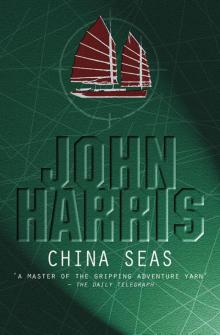 China Seas
China Seas The Mercenaries
The Mercenaries Road To The Coast
Road To The Coast The Thirty Days War
The Thirty Days War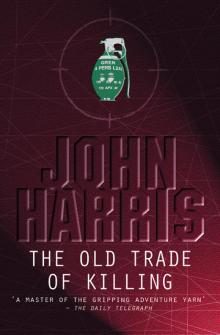 The Old Trade of Killing
The Old Trade of Killing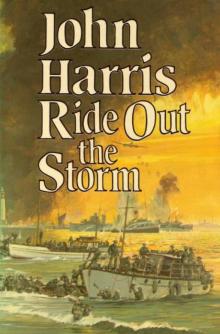 Ride Out The Storm
Ride Out The Storm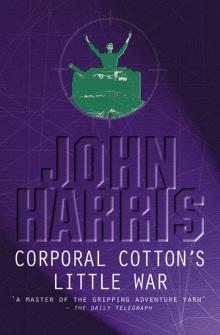 Corporal Cotton's Little War
Corporal Cotton's Little War Fox from His Lair
Fox from His Lair Paint The Rainbow
Paint The Rainbow Flawed Banner
Flawed Banner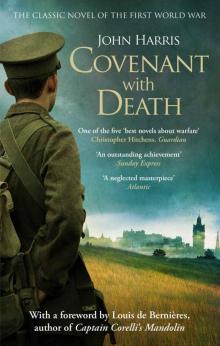 Covenant with Death
Covenant with Death So Far From God
So Far From God The Sea Shall Not Have Them
The Sea Shall Not Have Them The Cross of Lazzaro
The Cross of Lazzaro Smiling Willie and the Tiger
Smiling Willie and the Tiger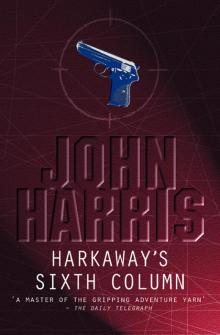 Harkaway's Sixth Column
Harkaway's Sixth Column The Sleeping Mountain
The Sleeping Mountain The Claws of Mercy
The Claws of Mercy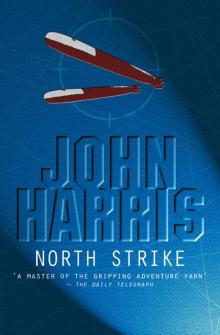 North Strike
North Strike Picture of Defeat
Picture of Defeat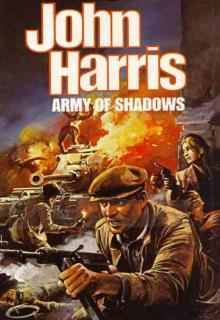 Army of Shadows
Army of Shadows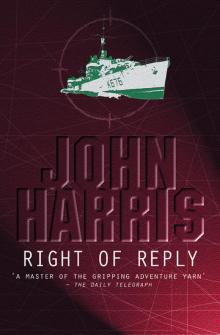 Right of Reply
Right of Reply Getaway
Getaway The Lonely Voyage
The Lonely Voyage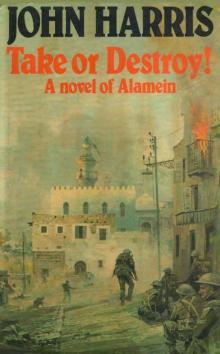 Take or Destroy!
Take or Destroy!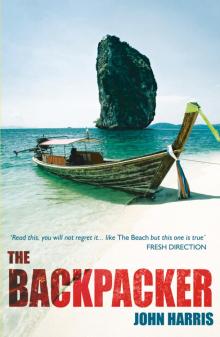 The Backpacker
The Backpacker A Funny Place to Hold a War
A Funny Place to Hold a War Swordpoint (2011)
Swordpoint (2011)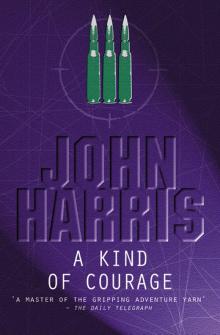 A Kind of Courage
A Kind of Courage